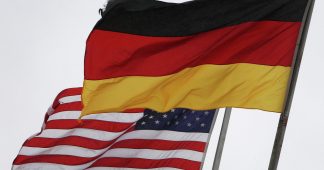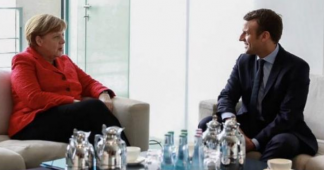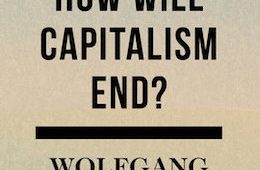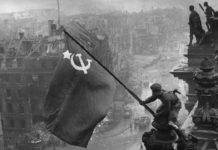By Sebastian Friedrich, Gabriel Kuhn
Germany’s AfD poses as a defender of the “common man,” but seeks to impose an authoritarian form of neoliberalism.
The AfD is currently represented in thirteen of Germany’s sixteen state parliaments — a seemingly unthinkable development only five years ago — and set to enter the national parliament, or Bundestag, later this year. But what kind of a party is the AfD? Why has it been able to shake up German politics, and what are the reasons behind its rise?
The Conservative Split
Since 1945, most of Germany’s conservatives have been organized in the Union, which always contained a strong national-conservative wing. This wing has come under increasing pressure due to fundamental shifts in German society in recent decades, the beginnings of which can be traced back to the 1960s: immigrants demanded to be more than just guests, women to be more than wives, and gays and lesbians to be more than sexual deviants. The ensuing social struggles led to significant changes in attitudes and values among the German population.
Several internal revolts against the Union’s “liberal drift” did indeed occur, but were not only unsuccessful, they actually helped to strengthen Merkel’s position, as numerous disenchanted right-wingers left the party in disgust. These renegades joined a growing, grassroots conservative movement accusing the Union of betraying the conservative cause. Here, what would eventually become the AfD began to coalesce.
Contradictions Within German Capital
The crisis of conservatism coincided with a crisis of neoliberalism, when the destruction wrought by the 2008 financial crisis made the dangers of neoliberalism blatantly obvious.
Generally speaking, a structural crisis can have two possible outcomes: either the ruling classes make adjustments to the prevailing order that allows it to survive, or the political paradigm undergoes a more fundamental shift. Although a paradigm shift in European politics seemed possible for a brief moment (Syriza’s rise in Greece, for example), it soon became clear that a slightly modified version of neoliberalism would prevail.
Supply remained the guiding principle of fiscal and economic policy not only in Germany but across the European Union (EU), and the austerity policies sweeping the continent were its logical consequence. However, a conflict emerged between the European Union’s neoliberal path, and a new, “national-neoliberal” position seeking to bolster national sovereignty. This current was particularly pronounced in Germany, not least because the euro, the common currency of nineteen European Union countries, was strongly affected by the economic crisis as well. The question of whether individual eurozone member states’ debts should be covered by all member states or only the indebted broke open a division within German capital.
For decades, Germany’s capitalists stood united, articulating their interests in a common voice. But the Great Recession has brought underlying differences to the fore, most notably that between companies primarily producing for international markets, and those primarily oriented toward domestic markets. This conflict of interests is key to understanding why certain factions of German capital have rallied behind the AfD.
Companies oriented towards international markets are relatively flexible when it comes to shifting production sites and consumer targets. Export-oriented capital profits from both the common European market and a weak euro, whereas for companies producing for the domestic market, it makes no difference whether their products are paid for in euro or a domestic currency like the old Deutschmark. For them, more European integration means more competition.
Many small and medium-size German companies resented the German government’s efforts to rescue the euro, thereby acting in the interests of export-oriented capital. These “euroskeptics” were supported by nationalist economists who demanded a strong nation-state in the face of European institutions to solve the crisis.
The new national-neoliberal current initially tried to gain a foothold in the mainstream parties, the Union and the Free Democratic Party (FDP), but largely failed. The euro had facilitated new ties across the continent that the established parties were unable and unwilling to sever. Faced with this intractable predicament, the euro skeptics found themselves marginalized and in need of an alternative organizational framework to fuse neoliberal economics with cultural conservatism and nation-state sovereignty. This framework was provided by the AfD, which set out to unite the traditional national-conservative camp with the new national neoliberal one.
The “Völkisch” Wing
It did not take long for a third camp, the ethno-nationalist or “völkisch” wing, to emerge inside the party. Völkisch nationalism, which has its roots in late nineteenth-century romantic, pan-Germanic ideals, equates national identity with an exclusive and homogeneous population. The völkisch state is not based on a social contract but on the common heritage of its people (Volk), where the question of who belongs is determined by ancestry. This ancestry is not necessarily of an exclusively ethnic nature, but stipulates a monolithic understanding of culture. The “Other” might not be excluded because of physical traits, but is marked by a cultural difference regarded as essential and irrevocable. Kulturkreis (literally, “cultural circle”) is the German term most commonly used for these supposedly hegemonic communities. Contradictions within them as well as historical exchanges and overlaps between them are denied or trivialized. As a quasi-natural category, the Kulturkreis defines the identity of any individual associated with it.
The AfD now began to target voters among the “losers of globalization.” The party’s initial support had mostly come from professionals, entrepreneurs, and the upper echelons of society. Now, support among the unemployed and underprivileged grew as well, due to the AfD’s successful linking of social inequality to immigration in the public eye. While the similar material interests of refugees and the German poor were downplayed, ethnic and cultural differences were magnified.
Representatives of the völkisch wing even spoke of a “new social question” in Germany, implying that the main contradiction was no longer between the bottom and top of society, but between inside and outside. The AfD rarely targets the wealthy in its defense of the “common man,” but instead focuses its ire on immigrants and refugees, accusing them of taking government handouts without contributing to the welfare state. According to the AfD, it is migrants and refugees who are robbing German workers of the fruits of their labor, not their German bosses.
Defending the “common man” has become a central part of the AfD’s public relations. But the party’s rhetoric should not be confused with its program, which favors tax reliefs that benefit the wealthy and stands for an authoritarian version of neoliberal economics.
To really understand why the AfD is able to gain support among the German working class, we need to consider yet another crisis it profits from: the crisis of socialism.
As in many industrialized nations, social inequality has widened in Germany since the 1970s. With ideological support for capitalism waning as a result of the Great Recession, this has become a major political issue. Although the German economy emerged from the recession relatively unscathed due to aggressive foreign trade and low domestic wages, the golden age of German capitalism is over.
Postwar Germany was characterized by social conservatism, strong trade unions, low unemployment, and near universal support for democratic parliamentarism. When neoliberal attempts to open up new markets and guarantee permanent growth through deregulation and privatization failed, the working class paid the price: wages declined, labor became increasingly flexible, employment less secure, and a precarious low-wage sector was established.
A social crisis does not automatically benefit the Left. While Die Linke has been able to attract a number of dissatisfied workers, working-class support for the Social Democratic Party (SPD) has plummeted in the past fifteen years. In its attempt to keep up with economic developments, the SPD ignored the interests of working-class people and transformed itself into a reliable political agent of neoliberalism. The AfD often appears as the only party addressing the declining living standards of working-class people, albeit with false, nationalist solutions.
A hundred years ago, left-wing writer Kurt Tucholsky likened the average German to a cyclist: sheepishly looking up and viciously kicking down. All of the AfD’s promises are based on this image.
The New Right
The AfD is the result of distinct yet converging developments: the crisis of conservatism, the crisis of capital, and the crisis of socialism. This is the background against which a new right, with the AfD at its center, has emerged. It comprises media outlets, intellectuals, social movements, think tanks, Christian fundamentalists, student fraternities, anti-feminist organizations, libertarians, aristocrats, and certain factions of capital.
The AfD’s single biggest threat is by far internal conflict within its own ranks. Should the party collapse in the near future, it will be for this reason alone. The new right is extremely heterogeneous, and strife can break out at any time. Moderate national conservatives and national neoliberals are deeply concerned about the völkisch wing collaborating with forces of the extra-parliamentary far right. The biggest potential for conflict, however, relates to economic policy, as the party has failed to unite on key issues like free trade. While some members reject the Transatlantic Trade and Investment Partnership (TTIP) categorically, others are willing to support it if certain conditions are met. Concrete policies proposals which serve the interests of Germany’s wealthiest stand alongside rhetorical claims to represent the poor and downtrodden. The völkisch wing’s attempts to introduce welfare policies clash with the party’s capital-friendly program and the strong support it still enjoys among small and medium-size business owners and the petty bourgeoisie.
Uniting all currents of the party is an ideology of inequality. Whether the focus lies on the collective (as in the völkisch wing) or on the individual (as in the national-neoliberal wing) does not matter. The motto is the same: the stronger shall rule over the weaker.
The Left’s Response
For political analysts, the AfD’s success comes as no surprise. Polls have shown that a party to the right of the Union has great potential in Germany for a long time. About 20 percent of the population has regularly declared their willingness to vote for such a party if a serious contender arose. In the past, the success of right-wing parties was short-lived, mainly due to conflicts within the broader right-wing movement. In the 1980s and 1990s, both the Republicans (Die Republikaner) and the German People’s Union (Deutsche Volksunion, DVU) were represented in some of Germany’s state parliaments. The far right National Democratic Party (NPD) had members elected to several state parliaments more recently, but its appeal to conservative voters remained limited due to its clear links to the country’s Nazi past. Currently, the NPD plays a negligible role in electoral politics, not least due to the rise of the AfD.
As stated above, the AfD is the first postwar party able to unite the different currents of the German right. However, it is only supported by a minority of the German population (albeit a significant one). It polls at 7-10 percent nationwide, rivaling other smaller opposition parties like the Greens, FDP, and Die Linke, but it does not have the power to shape government policy.
In this light, it appears that both the established parties and the media have exaggerated the threat posed by the AfD. The breaking of political taboos is a strategic tool that grants it disproportionate media attention. At the same time, government actions often escape scrutiny. After all, it was the Union and the SPD that drastically curtailed German asylum law in the past eighteen months, not the AfD. As a consequence, refugees receive less financial support and social services, asylum applications are rejected without proper investigation, Residenzpflicht (“mandatory residence”) has been reintroduced, severely limiting the free movement of asylum seekers within Germany, and war-torn countries have been declared safe, meaning that refugees are returned to them in increasing numbers. All of these measures reflect and echo the AfD’s demands.
Despite this, the ruling parties continue to present themselves as the last line of defense against the growing far right. Liberals, Social Democrats, modern conservatives, and neoliberal cosmopolitans claim to form a front against ultra-conservative and völkisch forces. Many on the left have helped to establish this front, but it is the wrong front to fight on.
Germany’s mainstream neoliberals welcome society’s modernization. They are fairly socially progressive, while their economic program is based exclusively on individual performance and competition. They have implemented laws to protect social and cultural diversity, but have also prioritized the interests of export-oriented capital at the expense of the working class. Progressive neoliberalism reached its apex in the coalition between Social Democrats and Greens, which governed Germany from 1998 to 2005. Representing the left wing of what Tariq Ali has dubbed the “extreme center,” it managed to improve the legal status of minorities while at the same time dismantling the welfare state many of them relied on. It also passed a series of tax breaks for the rich. The Union-led governments that followed have pursued the same course. The AfD’s response is twofold: it seeks to roll back civil rights reforms and reinterpret neoliberalism in nationalist and protectionist terms.
It appears as if there are only two possible positions with regard to German asylum law: Merkel’s and the AfD’s. The solidarity with refugees demonstrated by large parts of the German population has not been led to a viable alternative. The Right quickly defined the terms of the debate, and many on the left found themselves defending Angela Merkel and her humanitarian rhetoric. Similar patterns characterize debates on the European Union, globalization, and foreign military intervention: the Right sets the tone, the Left falls silent, and the established parties portray themselves as the noble defenders of civil society.
To free itself from this predicament is the German left’s biggest challenge today. Any left-wing project must be based on principles of solidarity, justice, and social equality. This means that it cannot limit itself to a critique of reactionary nationalism, thereby letting progressive neoliberalism off the hook — a left-wing project unable to position itself in opposition to both is doomed to fail.











